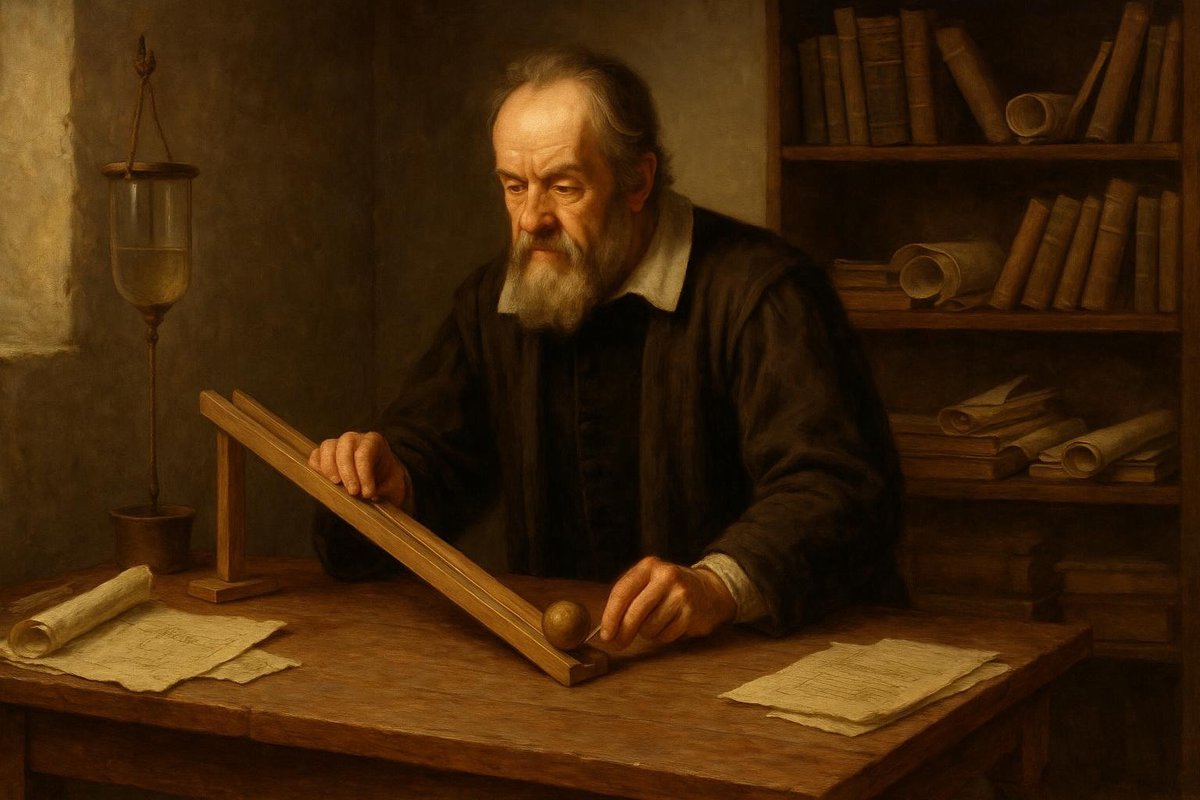
Legacy of a Revolutionary Thinker
Imagine a world where the laws of nature remained a mystery, shrouded in the dogma of ancient texts. Into this world stepped Galileo Galilei, a man whose curiosity was as boundless as the universe he sought to understand. In the early 17th century, Galileo embarked on an experiment that would unravel the enigma of motion, using a seemingly simple tool: the inclined plane.
Before Galileo’s time, the Aristotelian view dominated, suggesting heavier objects fell faster than lighter ones. Galileo dared to challenge this with a disciplined mind and a penchant for empirical evidence. His inclined plane experiment not only questioned the prevailing beliefs but also laid the groundwork for future scientific inquiries by emphasizing precision and repeatability.
Early Influences
Galileo’s intellectual journey was fueled by his early education in Pisa and his fascination with mathematics and mechanics. Influenced by his father, Vincenzo Galilei, an accomplished musician and scholar, Galileo learned the value of questioning established norms.
- Exposed to music’s mathematical patterns, sparking interest in numerical relationships.
- Studied at the University of Pisa, where Aristotelian physics dominated.
- Developed a strong foundation in mathematics, vital for his later work.
This background set the stage for his revolutionary thinking. Galileo’s education and family environment nurtured a skepticism towards accepted beliefs. As time passed, he began to scrutinize the inaccuracies within the Aristotelian doctrine.
Mental Models
Galileo’s approach to scientific inquiry was meticulous. He envisioned experiments in his mind, predicting outcomes based on mathematical calculations. His use of the inclined plane was a testament to his innovative thinking.
- Galileo theorized uniform acceleration using inclined planes.
- Devised a controlled environment to minimize external variables.
- Prioritized precision by using water clocks and measuring distances carefully.
His methodical approach revealed that objects accelerate uniformly regardless of their mass. Interestingly, Galileo’s mental models were not just about solving problems but about understanding the underlying principles of motion.
Challenges & Resilience
Galileo faced immense challenges. The academic and religious establishments were resistant to change, holding tightly to Aristotelian principles. Yet, his resilience never waned.
- Faced opposition from the Church and Aristotelian scholars.
- Endured trials and threats, yet continued to publish his findings.
- Overcame limited resources by using simple yet effective experimental setups.
No wonder his work was revolutionary. Despite societal pressures, Galileo’s commitment to truth persisted. He recorded meticulous observations, which others could replicate, reinforcing the validity of his discoveries.
Legacy
Galileo’s inclined plane experiment was more than a scientific achievement; it was a paradigm shift. It illustrated how empirical methods could uncover nature’s truths.
- Inspired future scientists, including Isaac Newton, shaping modern physics.
- Promoted scientific inquiry based on observation and experimentation.
- Galileo’s methods became a cornerstone of the scientific revolution.
His ability to think critically and innovate continues to inspire scientists today. As we delve deeper into the mysteries of the universe, Galileo’s legacy reminds us of the power of precision and perseverance.
Fuel Someone Else’s Curiosity
Galileo’s story is a testament to how curiosity and dedication can change the world. Share this story with someone who appreciates the beauty of scientific inquiry. Let’s continue to inspire others to question, explore, and challenge the boundaries of knowledge.

Leave a Reply